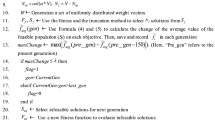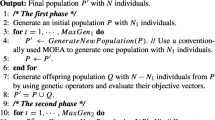Abstract
Constrained many-objective optimization problems (CMaOPs) pose great challenges for evolutionary algorithms to reach an appropriate trade-off of solution feasibility, convergence, and diversity. To deal with this issue, this paper proposes a constrained many-objective evolutionary algorithm based on adaptive infeasible ratio (CMaOEA-AIR). In the evolution process, CMaOEA-AIR adaptively determines the ratio of infeasible solutions to survive into the next generation according to the number and the objective values of the infeasible solutions. The feasible solutions then undergo an exploitation-biased environmental selection based on indicator ranking and diversity maintaining, while the infeasible solutions undergo environmental selection based on adaptive selection criteria, aiming at the enhancement of exploration. In this way, both feasible and infeasible solutions are appropriately used to balance the exploration and exploitation of the search space. The proposed CMaOEA-AIR is compared with the other state-of-the-art constrained many-objective optimization algorithms on three types of CMaOPs of up to 15 objectives. The experimental results show that CMaOEA-AIR is competitive with the compared algorithms considering the overall performance in terms of solution feasibility, convergence, and diversity.












Similar content being viewed by others
References
Agrawal RB, Deb K, Agrawal RB (2000) Simulated binary crossover for continuous search space. Compl Syst 9(3):115–148
Antonio LM, Coello CAC (2013) Use of cooperative coevolution for solving large scale multiobjective optimization problems. In: Proceedings of IEEE congress on evolutionary computation (CEC), pp 2758–2765
Asafuddoula M, Ray T, Sarker R (2015) A decomposition-based evolutionary algorithm for many objective optimization. IEEE Trans Evol Comput 19(3):445–460
Biswas S, Kundu S, Das S (2015) Inducing niching behavior in differential evolution through local information sharing. IEEE Trans Evol Comput 19(2):246–263
Blank J, Deb K (2022) Handling constrained multi-objective optimization problems with heterogeneous evaluation times: proof-of-principle results. Memet Comput 14:135–150
Chai R, Tsourdos A, Savvaris A, Chai S, Xia Y (2021) Solving constrained trajectory planning problems using biased particle swarm optimization. IEEE Trans Aerosp Electr Syst 57(3):1685–1701
Chai R, Tsourdos A, Savvaris A, Chai S, Xia Y, Chen C (2020) Multiobjective optimal parking maneuver planning for autonomous ground vehicles. IEEE Trans Indust Electr 67(12):10809–10821
Chai R, Tsourdos A, Savvaris A, Chai S, Xia Y, Chen CL (2021) Multiobjective overtaking maneuver planning for autonomous ground vehicles. IEEE Trans Cybern 51(8):4035–4049
Chen H, Tian Y, Pedrycz W, Wu G, Wang R, Wang L (2020) Hyperplane assisted evolutionary algorithm for many-objective optimization problems. IEEE Trans Cybern 50(7):3367–3380
Cheng R, Jin Y, Olhofer M, Sendhoff B (2016) A reference vector guided evolutionary algorithm for many-objective optimization. IEEE Trans Evol Comput 20(5):773–791
Deb K, Goyal M (1996) A combined genetic adaptive search (geneas) for engineering design. Comput Sci Inform 26(4):30–45
Deb K, Jain H (2014) An evolutionary many-objective optimization algorithm using reference-point-based nondominated sorting approach, Part I: Solving problems with box constraints. IEEE Trans Evol Comput 18(4):577–601
Deb K, Pratap A, Agarwal S, Meyarivan T (2002) A fast and elitist multiobjective genetic algorithm: NSGA-II. IEEE Trans Evol Comput 6(2):182–197
Deb K, Pratap A, Meyarivan T (2001) Constrained test problems for multi-objective evolutionary optimization. In: 2001 evolutionary multi-criterion optimization, first international conference (Proc. 1st EMO), pp 284 – 298
Deb K, Thiele L, Laumanns M, Zitzler E (2005) Scalable test problems for evolutionary multiobjective optimization. Springer, London, pp 105–145
Fan Z, Li H, Caimin Wei, Li W, Han Huang, Cai X, Cai Z (2016) An improved epsilon constraint handling method embedded in moea/d for constrained multi-objective optimization problems. In: 2016 IEEE symposium series on computational intelligence (SSCI), pp 1–8
Fan Z, Li W, Cai X, Li H, Wei C, Zhang Q, Deb K, Goodman E (2020) Difficulty adjustable and scalable constrained multi-objective test problem toolkit. Evol Comput 28(3):339–378
Geng H, Zhang M, Huang L, Wang X (2006) Infeasible elitists and stochastic ranking selection in constrained evolutionary multi-objective optimization. Lect Note Comput Sci 4247:336–344
Huband S, Hingston P, Barone L, While L (2006) A review of multiobjective test problems and a scalable test problem toolkit. IEEE Trans Evol Comput 10(5):477–506
Ishibuchi H, Masuda H, Nojima Y (2015) A study on performance evaluation ability of a modified inverted generational distance indicator. In: Conference on genetic & evolutionary computation, pp 695–702
Jain H, Deb K (2014) An evolutionary many-objective optimization algorithm using reference-point based nondominated sorting approach, Part II: Handling constraints and extending to an adaptive approach. IEEE Trans Evol Comput 18(4):602–622
Jan MA, Zhang Q (2010) MOEA/D for constrained multiobjective optimization: some preliminary experimental results. In: 2010 UK workshop on computational intelligence (UKCI), pp 1–6
Jiao L, Luo J, Shang R, Liu F (2014) A modified objective function method with feasible-guiding strategy to solve constrained multi-objective optimization problems. Appl Soft Comput 14(PART C):363–380
Jiao R, Zeng S, Li C, Yang S, Ong YS (2021) Handling constrained many-objective optimization problems via problem transformation. IEEE Trans Cybern 51(10):4834–4847
Li B, Tang K, Li J, Yao X (2016) Stochastic ranking algorithm for many-objective optimization based on multiple indicators. IEEE Trans Evol Comput 20(6):924–938
Li H, Zhang Q (2009) Multiobjective optimization problems with complicated pareto sets, MOEA/D and NSGA-II. IEEE Trans Evol Comput 13(2):284–302
Li K, Chen R, Fu G, Yao X (2019) Two-archive evolutionary algorithm for constrained multiobjective optimization. IEEE Trans Evol Comput 23(2):303–315
Li K, Deb K, Zhang Q, Kwong S (2015) An evolutionary many-objective optimization algorithm based on dominance and decomposition. IEEE Trans Evol Comput 19(5):694–716
Liang Z, Hu K, Ma X, Zhu Z (2021) A many-objective evolutionary algorithm based on a two-round selection strategy. IEEE Trans Cybern 51(3):1417–1429
Liang Z, Luo T, Hu K, Ma X, Zhu Z (2021) An indicator-based many-objective evolutionary algorithm with boundary protection. IEEE Trans Cybern 51(9):4553–4566
Liu C, Zhao Q, Yan B, Elsayed S, Ray T, Sarker R (2019) Adaptive sorting-based evolutionary algorithm for many-objective optimization. IEEE Trans Evol Comput 23(2):247–257
Liu Y, Gong D, Sun J, Jin Y (2017) A many-objective evolutionary algorithm using a one-by-one selection strategy. IEEE Trans Cybern 47(9):2689–2702
Liu Z, Qin Y, Song W, Zhang J, Li K (2022) Multiobjective-based constraint-handling technique for evolutionary constrained multiobjective optimization: a new perspective. IEEE Trans Evol Comput. https://doi.org/10.1109/TEVC.2022.3194729
Liu Z, Wang Y (2019) Handling constrained multiobjective optimization problems with constraints in both the decision and objective spaces. IEEE Trans Evol Comput 23(5):870–884
Ma L, Li N, Guo Y, Wang X, Yang S, Huang M, Zhang H (2021) Learning to optimize: reference vecotr reinforcement learning adaption to constrained many-objective optimization of industrial copper burdening system. IEEE Trans Evol Comput. https://doi.org/10.1109/TCYB.2021.3086501
Ma Z, Wang Y (2019) Evolutionary constrained multiobjective optimization: test suite construction and performance comparisons. IEEE Trans Evol Comput 23(6):972–986
Ming F, Gong W, Wang L, Gao L (2022) A constrained many-objective optimization evolutionary algorithm with enhanced mating and environmental selections. IEEE Trans Cybern. https://doi.org/10.1109/TCYB.2022.3151793
Ming M, Wang R, Ishibuchi H, Zhang T (2021) A novel dual-stage dual-population evolutionary algorithm for constrained multi-objective optimization. IEEE Trans Evol Comput 26(5):1129–1143
Pamulapati T, Mallipeddi R, Suganthan PN (2019) \(I_{{\rm SDE}}\)+: an indicator for multi and many-objective optimization. IEEE Trans Evol Comput 23(2):346–352
Ray T, Singh HK, Isaacs A, Smith W (2009) Infeasibility driven evolutionary algorithm for constrained optimization. Constraint-Handl Evol Optim 198:145–165
Storn R, Price K (1997) Differential evolution: a simple and efficient heuristic for global optimization over continuous spaces. J Glob Optim 11(4):341–359
Tian Y, Cheng R, Zhang X, Jin Y (2017) Platemo: a matlab platform for evolutionary multi-objective optimization [educational forum]. IEEE Comput Intell Magaz 12(4):73–87
Tian Y, Cheng R, Zhang X, Su Y, Jin Y (2019) A strengthened dominance relation considering convergence and diversity for evolutionary many-objective optimization. IEEE Trans Evol Comput 23(2):331–345
Tian Y, Zhang T, Xiao J, Zhang X, Jin Y (2021) A coevolutionary framework for constrained multiobjective optimization problems. IEEE Trans Evol Comput 25(1):102–116
Trivedi A, Srinivasan D, Sanyal K, Ghosh A (2017) A survey of multiobjective evolutionary algorithms based on decomposition. IEEE Trans Evol Comput 21(3):440–462
Wang J, Liang G, Zhang J (2019) Cooperative differential evolution framework for constrained multiobjective optimization. IEEE Trans Cybern 49(6):2060–2072
de Winter R, Bronkhorst P, van Stein B, Bäck T (2022) Constrained multi-objective optimization with a limited budget of function evaluations. Memet Comput 14:151–164
Wu G, Wen X, Wang L, Pedrycz W, Suganthan PN (2021) A voting-mechanism based ensemble framework for constraint handling techniques. IEEE Trans Evol Comput 26(4):646–660
Xiang Y, Peng J, Zhou Y, Li M, Chen Z (2017) An angle based constrained many-objective evolutionary algorithm. Appl Intell 47(3):705–720
Xiang Y, Zhou Y, Li M, Chen Z (2017) A vector angle-based evolutionary algorithm for unconstrained many-objective optimization. IEEE Trans Evol Comput 21(1):131–152
Xiang Y, Zhou Y, Yang X, Huang H (2020) A many-objective evolutionary algorithm with pareto-adaptive reference points. IEEE Trans Evol Comput 24(1):99–113
Yang W, Chen L, Li Y, Zhang J (2021) A constrained multi/many-objective particle swarm optimization algorithm with a two-level balance scheme. IEEE Access 9(1):122509–122531
Yuan J (2021) Dynamic grid-based uniform search for solving constrained multiobjective optimization problems. Memet Comput 13(4):497–508
Zhang J, Cao J, Zhao F, Chen Z (2022) A constrained multi-objective optimization algorithm with two cooperative populations. Memet Comput 14(1):95–113
Zhou A, Jin Y, Zhang Q, Sendhoff B, Tsang E (2006) Combining model-based and genetics-based offspring generation for multi-objective optimization using a convergence criterion. In: Proceedings of IEEE international conference on evolutionary computation (CEC), pp 892–899
Zhou Y, Zhu M, Wang J, Zhang Z, Xiang Y, Zhang J (2020) Tri-goal evolution framework for constrained many-objective optimization. IEEE Trans Syst Man Cybern 50(8):3086–3099
Zhu Q, Zhang Q, Lin Q (2020) A constrained multiobjective evolutionary algorithm with detect-and-escape strategy. IEEE Trans Evol Comput 24(5):938–947
Zhu Q, Zhang Q, Lin Q, Sun J (2019) MOEA/D with Two types of weight vectors for handling constraints. In: Proceedings of IEEE congress on evolutionary computation (CEC), pp 1359–1365
Zitzler E, Kunzli S (2004) Indicator-based selection in multiobjective search. Lect Note Comput Sci 3242:832–842
Zitzler E, Laumanns M, Thiele L (2001) Spea2: Improving the strength pareto evolutionary algorithm. In: Evolutionary methods for design optimization and control with applications to industrial problems, pp 95 – 100
Zitzler E, Thiele L (1999) Multiobjective evolutionary algorithms: a comparative case study and the strength pareto approach. IEEE Trans Evol Comput 3(4):257–271
Zitzler E, Thiele L, Laumanns M, Fonseca CM, Da Fonseca VG (2003) Performance assessment of multiobjective optimizers: an analysis and review. IEEE Trans Evol Comput 7(2):117–132
Acknowledgements
This work was supported in part by the National Key Research and Development Program of China (2021YFB2900800), in part by the Natural Science Foundation of Guangdong Province, China (2021A1515011911) and in part by the Shenzhen Fundamental Research Program (20200811181752003 and JCYJ20220531102617039).
Author information
Authors and Affiliations
Corresponding author
Additional information
Publisher's Note
Springer Nature remains neutral with regard to jurisdictional claims in published maps and institutional affiliations.
Supplementary Information
Below is the link to the electronic supplementary material.
Rights and permissions
Springer Nature or its licensor (e.g. a society or other partner) holds exclusive rights to this article under a publishing agreement with the author(s) or other rightsholder(s); author self-archiving of the accepted manuscript version of this article is solely governed by the terms of such publishing agreement and applicable law.
About this article
Cite this article
Liang, Z., Chen, C., Wang, X. et al. Constrained many-objective evolutionary algorithm based on adaptive infeasible ratio. Memetic Comp. 15, 281–300 (2023). https://doi.org/10.1007/s12293-023-00393-0
Received:
Accepted:
Published:
Issue Date:
DOI: https://doi.org/10.1007/s12293-023-00393-0




